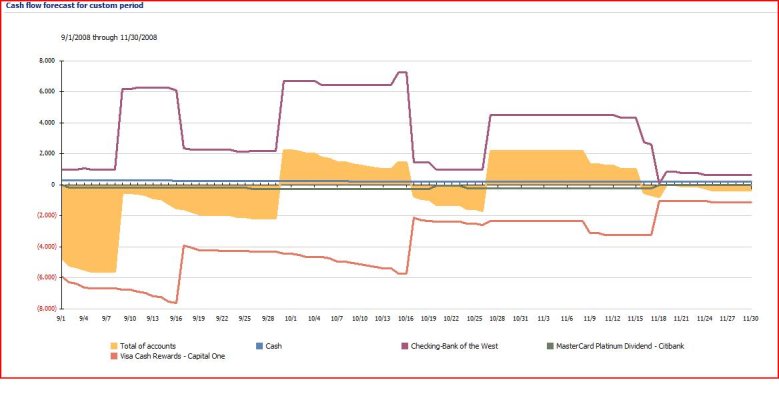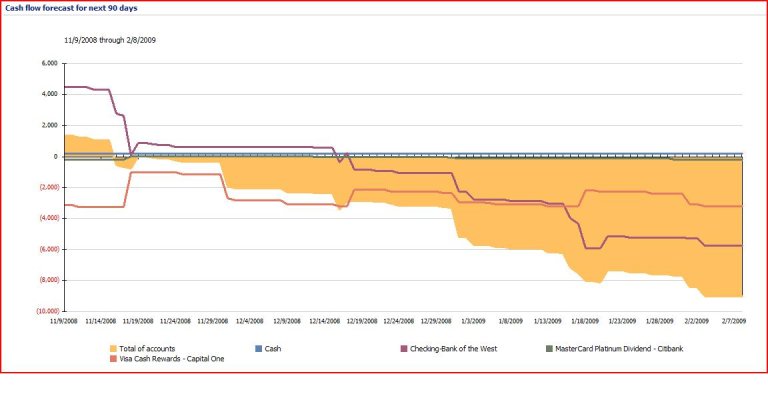thefed
Thinks s/he gets paid by the post
- Joined
- Oct 29, 2005
- Messages
- 2,203
According to a book I've seen mentioned on here several times (Why Smart People Make Big Money Mistakes...or something like that), mental accounting accounts for a lot of the mistakes people make financially. They make it out to be a very bad thing....and in some cases I see their point. They uses examples like finding money...most people are more likely to spend that money quicker and with less thought than the same amount of $$ they earned. The book got me thinking nonetheless....and I started digging.
My name is Jason, and I am addicted to mental accounting.
I have so many accounts and mental 'tags' on $$ that I often get confused. I used to be a 'one-account-guy' because in reality, it makes no difference where you store it...if you spend more than you have you've got trouble. Save more than you spend and you're in the positive. But lately I've developed all kinds of schemes to save money.
I have a regular checking that I deposit all $$ into. From there, it's swept away weekly into a high yield checking. Once that acct hits $5k, I pull the CASH out and hide it under my bed....seriously. That money has NEVER been spent ever. Some of the other money is swept into a new vehicle ING checking which I do not touch under any circumstance. some more money is swept weekly into my roth ira, traditional vanguard acct, and simple ira. If I get paid cash on a job I throw that into another box in the house that I dip into for fun stuff....like an upcoming vegas trip, or the stripclub, or a night out with the wife.....or a night at the stripclub with the wife. Then I manually sweep a couple bucks every so often into another checking for yearly self employment taxes. If I ever get paid from a large job, I often allocate a portion of that money to yet ANOTHER account which serves various purposes. The $4k in there now is tagged for my next property tax payment, the next 2 months of business advertising, finishing my bathroom i'm installing, and a new roof for my shed. Then , my tenants' rent payments goto another account whcih isn't really tagged for anything. Sometimes I use it for taxes, other times for the slow winter months....but it's a last resort account and doesnt get touched til I'm desparate. And of course, I use the rest of the $$ in my checking to pay bills
All of this seems really crazy when I look at it now, but it has served me well. when my main account dips under $3k I hit panic mode because I know soooo many things get pulled from there automatically. so then my day-to-day spending habits are throttled back until it's back where I feel comfortable. Of course, this only works because I turn a blind eye to the other umpteen accounts I have.
Anyone else feel this type of mental accounting can be/has been beneficial?
My name is Jason, and I am addicted to mental accounting.
I have so many accounts and mental 'tags' on $$ that I often get confused. I used to be a 'one-account-guy' because in reality, it makes no difference where you store it...if you spend more than you have you've got trouble. Save more than you spend and you're in the positive. But lately I've developed all kinds of schemes to save money.
I have a regular checking that I deposit all $$ into. From there, it's swept away weekly into a high yield checking. Once that acct hits $5k, I pull the CASH out and hide it under my bed....seriously. That money has NEVER been spent ever. Some of the other money is swept into a new vehicle ING checking which I do not touch under any circumstance. some more money is swept weekly into my roth ira, traditional vanguard acct, and simple ira. If I get paid cash on a job I throw that into another box in the house that I dip into for fun stuff....like an upcoming vegas trip, or the stripclub, or a night out with the wife.....or a night at the stripclub with the wife. Then I manually sweep a couple bucks every so often into another checking for yearly self employment taxes. If I ever get paid from a large job, I often allocate a portion of that money to yet ANOTHER account which serves various purposes. The $4k in there now is tagged for my next property tax payment, the next 2 months of business advertising, finishing my bathroom i'm installing, and a new roof for my shed. Then , my tenants' rent payments goto another account whcih isn't really tagged for anything. Sometimes I use it for taxes, other times for the slow winter months....but it's a last resort account and doesnt get touched til I'm desparate. And of course, I use the rest of the $$ in my checking to pay bills
All of this seems really crazy when I look at it now, but it has served me well. when my main account dips under $3k I hit panic mode because I know soooo many things get pulled from there automatically. so then my day-to-day spending habits are throttled back until it's back where I feel comfortable. Of course, this only works because I turn a blind eye to the other umpteen accounts I have.
Anyone else feel this type of mental accounting can be/has been beneficial?


